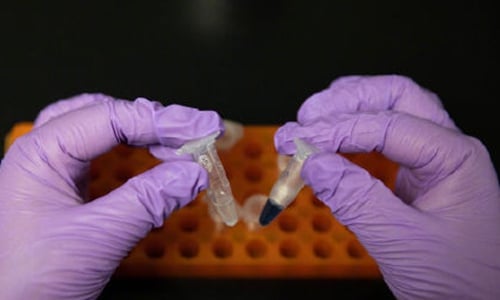June 21, 2025 | 02:35 GMT +7
June 21, 2025 | 02:35 GMT +7
Hotline: 0913.378.918
June 21, 2025 | 02:35 GMT +7
Hotline: 0913.378.918

Photo:Weibo
The research is the first time in the world to achieve synthesis of starch from carbon dioxide. Scientists believe it will have a revolutionary impact on future agricultural production and bio-manufacturing.
Ma Yanhe, director of the Tianjin Institute of Industrial Biology (TIB) and corresponding author of the paper named "Cell-free chemoenzymatic starch synthesis from carbon dioxide," told media that the institute designed a new pathway of unnatural carbon dioxide fixation and starch synthesis from scratch in an 11-step reaction.
"It also means starch could in future be made from carbon dioxide in a process similar to brewing beer," Ma said, noting carbon dioxide can be reduced to methanol, which can be converted to starch.
Preliminary lab tests show that synthetic starch is about 8.5 times more efficient than starch produced by conventional agriculture. Under the condition of sufficient energy supply and current technical parameters, the annual production of starch of 1 cubic meter bioreactor is equivalent to the annual production of starch of 5 mu (0.33 hectare) of corn in China.
"The new route made it possible to shift starch production from traditional agricultural cultivation to industrial manufacturing. And it may be possible to satisfy our carbohydrate needs without farming in the future," a research fellow with Institute of Biophysics, CAS, told the Global Times on Friday on condition of anonymity.
Cai Tao, the lead author of the paper and an associate professor of TIB, said that if the future cost of their approach can reduce to a more economic-feasible level, compared with agricultural, it will save more than 90 percent of the arable land and freshwater resources, and avoid negative effect on the environment from pesticide and chemical fertilizer.
It will improve food security, upgrade economic development of carbon neutrality, and promote sustainable biology-based societies, Cai said.
Starch is the most important component of grain and also an important industrial raw material. Food crisis and climate change are major challenges facing mankind. Sustainable supply of grain starch and conversion and utilization of carbon dioxide are the directions scientific and technological innovation should take, experts said.
According to TIB, starch is mainly produced by corn and other crops through the fixation of carbon dioxide through natural photosynthesis. Starch synthesis and accumulation involve more than 60 metabolic reactions and complex physiological regulation, and the theoretical energy conversion efficiency is only about 2 percent at present.
"The cultivation of crops usually requires a long period of time, and requires the use of a large amount of land, water, fertilizers, pesticides and other agricultural production materials… The design of artificial biological system to synthesize starch independent of plant photosynthesis is a major disruptive technology that will have a great impact on the world," the expert with CAS told Global Times.
Since 2015 the TIB has focused on the bioconversion and utilization of synthetic starch and carbon dioxide, and formed a research team of young scientists with an average age of 30. The team has been deeply engaged in the research and development of synthetic starch project for six years.
The research work is a key project of the Chinese Academy of Sciences and a key research direction of the National Innovation Center for Synthetic Biotechnology.
(Global Times)

(VAN) Poultry production in Poland, which has only started recovering from devastating bird flu outbreaks earlier this year, has been hit by a series of outbreaks of Newcastle disease, with the veterinary situation deteriorating rapidly.

(VAN) Extensive licensing requirements raise concerns about intellectual property theft.

(VAN) As of Friday, a salmonella outbreak linked to a California egg producer had sickened at least 79 people. Of the infected people, 21 hospitalizations were reported, U.S. health officials said.

(VAN) With the war ongoing, many Ukrainian farmers and rural farming families face limited access to their land due to mines and lack the financial resources to purchase needed agricultural inputs.

(VAN) Vikas Rambal has quietly built a $5 billion business empire in manufacturing, property and solar, and catapulted onto the Rich List.

(VAN) Available cropland now at less than five percent, according to latest geospatial assessment from FAO and UNOSAT.

(VAN) Alt Carbon has raised $12 million in a seed round as it plans to scale its carbon dioxide removal work in the South Asian nation.